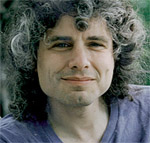| The Third Culture |
| |||||||
 I'm very favorably impressed with Steven Pinker. He's going to be a superstar well into the twenty-first century. What's particularly notable is his work on the evolution of our language capability, and being able to talk about this in specific terms. There are features there that have been evolving, and that we can interpret with respect to why they evolved. I remember speculating in my 1966 book about what it is that make the human species special. There have been all sorts of suggestions: bipedalism, tool use, that sort of thing, but it struck me at the time that the one defining capability is language.
George C. Williams What I find particularly interesting about Steve Pinker is the clarity and resoluteness with which he turned his back on the ethos of MIT, where he was raised. This is somebody who was certainly educated in a very narrowly pinched and mandarin view about the nature of language and of cognitive science, and it involved giving no ground at all to evolutionary considerations. When I first met Steve, he seemed to me to be the perfect avatar of that attitude, the ultimate MIT cognitive-science product. But he's so smart; he saw the light, and shifted ground quite decisively and with great effect. That was wonderful to see.
| Steven Pinker "I call language an 'instinct', an admittedly quaint term for what other cognitive scientists have called a mental organ, a faculty, or a module. Language is a complex, specialized skill, which develops in the child spontaneously without conscious effort or formal instruction, is deployed without awareness of its underlying logic, is qualitatively the same in every individual, and is distinct from more general abilities to process information or behave intelligently." One of the central metaphors of the third culture is computation. The computer does computation and the mind does computation. To understand what makes birds fly, you may look at airplanes, because there are principles of flight and aerodynamics that apply to anything that flies. That is how the idea of computation figures into the new ways in which scientists are thinking about complicated systems. At first, people who wanted to be scientific about the mind tried to treat it by looking for fundamentals, as in physics. We had waves of so-called mathematical psychology, and before that psychologists were trying to find a simple building block-an "atom"-with which to reconstruct the mind. That approach did not work. It turns out that minds, which are brains, are extremely complicated artifacts of natural selection, and as such they have many emergent properties that can best be understood from an engineering point of view. We are also discovering that the world itself is very "kludgey"; it is made up of curious Rube Goldberg mechanisms that do cute tricks. This does not sit well with those who want science to be crystalline and precise, like Newton's pure mathematics. The idea that nature might be composed of Rube Goldberg machines is deeply offensive to people who have a strong esthetic drive-those who say that science must be beautiful, that it must be pure, that everything should be symmetrical and deducible from first principles. That esthetic has been a great motivating force in science, since Plato. Counteracting it is the esthetic that says the beauties of nature come from the interaction of mind-boggling complexities, and that it is complexity essentially most of the way down. The computational perspective-machines made out of machines made out of machines-is on the ascendant. The experimental psychologist Steven Pinker is a unifier, someone who ties a lot of big ideas together. He has studied visual cognition and language acquisition in the laboratory, and was one of the first to develop computational models of how children learn the words and grammar of their first language. He has merged Chomskyan ideas about an innate language faculty with the Darwinian theory of adaptation and natural selection. Pinker also wrote one of the most influential critiques of neural-network models of the mind. His 1994 book The Language Instinct discussed all aspects of language in a unified, Darwinian framework, and in a new book he tries to do the same for the rest of the mind, explaining "what the mind is, how it evolved, and how it allows us to see, think, feel, laugh, interact, enjoy the arts, and ponder the mysteries of life." STEVEN PINKER is professor in the Department of Brain and Cognitive Sciences at MIT; director of the McDonnell-Pew Center for Cognitive Neuroscience at MIT; author of Language Learnability and Language Development (1984), Learnability and Cognition (1989), The Language Instinct(1994), and How the Mind Works (1997). The Official Steven Pinker Web Page The
Unofficial Web Page about Steven Pinker Further Reading: "Organs
of Computation": A Talk with Steven Pinker on Edge "Language
Is a Human Instinct" in The Third Culture
|

